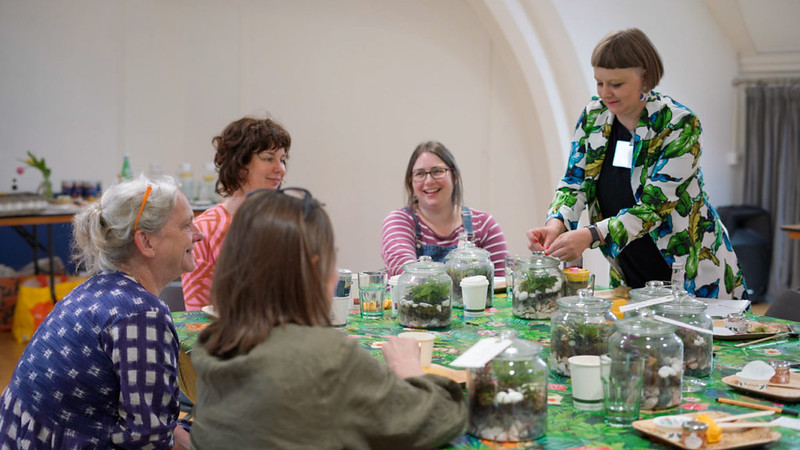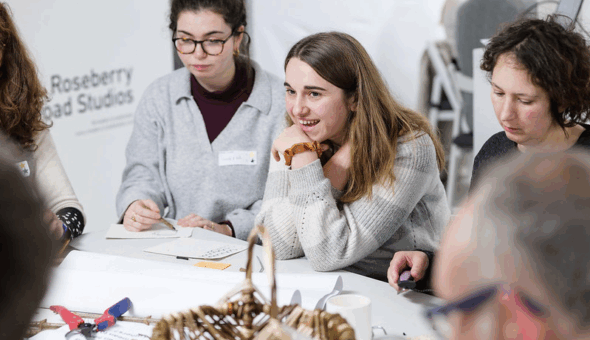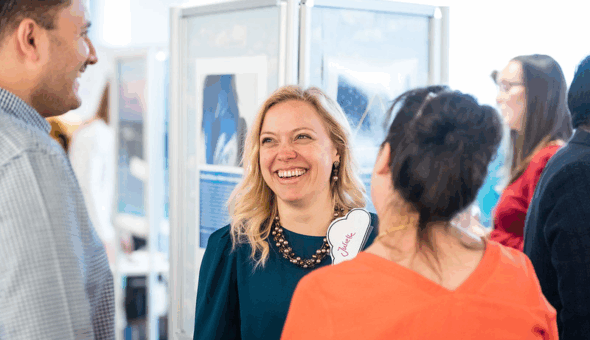ParticipatoryResearch@Bath has been investigating what the culture of research with/by/for people looks like at the University of Bath to create and enhance the conditions that enable the practice of participatory co-produced research at the University of Bath to flourish. This three-year project (2022-2025) has been funded through Research England's Participatory Research funding allocation.
The project has been delivered through three phases. Phase one explored and mapped what participatory research looks like at the University (March to August 2022), phase two focused on scoping and testing out approaches to support participatory research (December 2022 to July 2024), and phase three focused on embedding this work (August 2024 to July 2025).
As the project draws to a close, our Project Manager, Suzi Wright, and Project Officer, Laura Steen, share their learnings and reflections.
What have we done?
As part of ParticipatoryResearch@Bath, we have delivered the following:
- A map of participatory research and public and patient involvement practice at the University
- A report on participatory approaches across the whole research system
- A community listening programme prioritising community relationship building
- Co-created the Participate grants, and funded participatory research projects
- Streamlined payment systems and associated guidance
- Established Connect! events in collaboration with Bath Spa University, providing an informal opportunity for researchers and community organisations to meet and connect
- Set up a sharing practice network of researchers who use participatory research approaches
- Redeveloped our Minerva lectures, to create a two-way lecture series that engages local communities with research
- Commissioned and delivered in-person and online social impact training for community groups and researchers
- Created and delivered training and resources for participatory research and Patient and Public Involvement and Engagement (PPIE)
- Commissioned an exploratory project on welfare and wellbeing in relational research work
- Led events and webinars to share our work around relational practice in research and the impact on welfare and wellbeing, including a roundtable event
- Commissioned a film to share our learnings from our Welfare and Wellbeing in Relational Research Work report
- Expanded our support for upstream engagement (PPIE), developing new resources
- Presentations at conferences and sector events
- Blogs sharing our findings and learnings
What have you learnt?
Suzi – It’s been wonderful to discover that there is a lot more participatory research practice happening across the University than I had initially expected! We learnt through delivering this project that we need to support people to move along the participatory spectrum - so participatory practices will look very different for different people depending on where they are starting from. As a result, we've ended up with a much broader definition of what "counts" as participatory research to reflect the need to help people develop their approaches depending on where they are.
Through ParticipatoryResearch@Bath, we have been able to harness the potential of this work through bringing researchers together to share their practice and fund collaborative research through the Participate and Engage and Involve grants. It has been really heartening to find there is a real appetite from researchers to access funding at the pre-award stage to build relationships with community organisations. Our conversations with community organisations also revealed that they are interested in collaborating on research but often lack the capacity to do so. We provided community organisations with bursaries for application writing and initial relationship building as part of our Participate grant. Taking a participatory approach to co-developing the Participate funding call (with researchers and community partners) and sharing practice sessions has meant that we’ve been able to meet the needs and interests of our academic colleagues and provide bespoke training, funding, and community connections.
Through this project, I’ve been able to say to researchers at the University, “We’re here for you. Tell us what you need”. I’ve witnessed first-hand how researchers working in a collaborative way feel more seen and heard through our support.
Laura – Community organisations often see research as something that happens ‘over there’—abstract, distant, and not relevant to them. You can’t expect people outside academia to immediately ‘get’ research or its value and relevance to them unless they see examples of this and the tangible benefits. That’s why building connections and relationships in the local area is so important. Because of this, people have begun coming to and contributing to our events such as Minerva Lecture series, Connect!, and the Engage Awards. Taking the time to respond to the needs and interests of community organisations allows people to see the opportunities available and to recognise how research can be beneficial to them and how they can be beneficial to research.
I’ve received feedback from the events and my one-to-one meetings that people really value stepping outside of their usual bubble and sharing a learning experience together. Going to them is appreciated, it shows we are present, and this has strengthened engagement.
What are you proud of?
Suzi – I am very proud of our work around raising awareness of the relational practice of Public Engagement Professionals (PEPs). Many of us working in these roles often do not have the space or time to reflect on the potential impact of this way of working for ourselves and our community partners. We’ve been looking at developing a language around relational work for our sector and explore the support that PEPs need to work in this way. Through our work, we were invited to participate in a panel discussion at Engage 2024 and to deliver webinars around looking after ourselves and others for the Engage Academy in 2024 and 2025. My experience of participating in the Engage Academy 2024 and working as a peer learning facilitator for this year’s Engage Academy, has reinforced my awareness that many PEPs do not often have the language to articulate this way of working. We also hosted a roundtable event with our colleagues from HE, Culture, and the Third sector to explore how we raise awareness of relational practice and how to take this work forward.
This has felt like sector-leading work that has really resonated with our peers and those working in similar roles in other sectors. We also came across lots of interest in this work from our colleagues in community organisations, as many of their roles are relational and they are keen to be involved in this ongoing discussion. I feel proud that we’re driving this conversation forward through our upcoming film exploring the relational practice of PEPs, and our continuing work with the NCCPE.
Laura – I am proud of how I have been able to build on my existing connections in BANES and develop relationships and how this has fed into, and positively impacted, our work at the PEU. The Minerva lectures has been a key example of this, working with Rob to create a more engaged and responsive lecture series, with a panel of researchers and community speakers, it's been amazing to witness these shared platforms evolve and audiences diversify.
The Connect! events have also been well received and sparked unexpected connections. It’s a good feeling knowing that you are putting on something that people value and are really getting something from as they keep returning.
Have there been any unexpected outcomes?
Suzi – It’s been so valuable to be part of a peer learning group with public engagement colleagues from the University of Bristol, University of Exeter, Imperial College, London, King’s College London, and the University of Plymouth who are also delivering work funded by the Participatory Research Fund (PRF). The group formed as a small informal group in 2022, to stay in touch about our work on the PRF, and we initially met infrequently. As we have worked together more to explore opportunities and solve mutual challenges, our collaboration has continued to grow and strengthen, with the University of Leeds recently joining. The group has really picked up momentum now. We have been working together and with the NCCPE to advocate for the role of public engagement teams and PEPs in adding value to the PRF through our culture change work.
Laura – I think there’s been lots of unexpected connections, not only has my role created opportunities for researchers and community organisations to connect but it’s built connections between community organisations as well. For example, two panellists of one of our lectures ended up connecting afterwards and doing some work together. Also, I’ve ended up doing some volunteering myself through meeting with and connecting with Bath Community Kitchen, I started volunteering at their community meal in Twerton on Thursdays, they’re doing some amazing work to bring people from all walks of life together to connect over surplus food collected from food outlets in Bath.
What have been the challenges?
Suzi – I’ve encountered so much enthusiasm and passion from researchers who wish to involve people at the heart of their research, but sometimes they just don’t have the capacity to do it in an equitable and mutually beneficial way. Building meaningful relationships takes time and this is often underestimated. We’ve been able to connect researchers with potential community partners and establish initial introductions, but if the researcher/research team doesn’t have the capacity to nurture and grow this relationship then potential collaborations have ground to a halt. When this has occurred, it’s been disappointing as we don’t want to leave community groups in a state of limbo. We have learnt that we need to first understand how researchers want to work collaboratively with a community partner.
We also recognise that whilst we are enabling a two-way relationship, in reality it's a three-way relationship, as we are in it as well and our role (including our skills and experience) isn't to be underestimated. If one side of the relationship isn’t able to sustain things, then we are able to hold the relationships.
Laura – Something I didn’t quite anticipate about being the face—or the ‘front door’—of a university is that people often expect you to know everything that’s happening across the institution. That can feel a bit daunting, especially coming from smaller organisations where it was easier to stay across things. And, as is so often the case, it all comes back to funding: I’m working to encourage connections in the hope that they’ll lead to meaningful collaborations, but of course those collaborations can only happen if the funding is there. So sometimes it ends up feeling a bit like a catch-22.
What words, lines or phrases stick in your head when you think about the project?
Suzi – The word ‘Relational’ – it has changed the way I approach my practice. I have worked in a relational way for most of my career, prioritising building strong relationships at the heart of what I do, but I didn’t have the language to describe my approach. This project has enabled me to really explore our role as brokers or connectors – those of us in research enabler roles who are often doing the vital bridging, connecting, and mediation work. We delivered a session at Engage 2024 to share our thinking about looking after ourselves as research enablers. A delegate in attendance fed back that we need to “Really make that “glue” visible!”. This phrase really resonated with me – the important work that we brokers/connectors carry out is often invisible, but our work as the ‘glue’ is key.
Laura – As Suzi mentioned earlier, the relational side of this work is so important, yet it’s often overlooked. I think the idea of the ‘creative broker’—a term that participants decided against at the PEU creative brokerage event, because it felt too corporate and transactional— however it does highlight something important: the role of the person who holds relationships between researchers and community organisations should be highlighted and valued. In my case it has been, and that’s evolved into more of a ‘community connector,’ which feels like a much better fit.
What brought you the most amount of joy?
Suzi – I have really loved being able to provide opportunities for people to collaborate as part of this project. Early on in my role, I discovered that researchers who were taking a participatory approach to their research often felt very isolated and were keen to have the opportunity to meet other researchers working in this way. Based on this feedback, I established the Sharing Practice Get-togethers, informal lunchtime sessions, to bring researchers together to connect and share their best practice and challenges. The group continues to flourish into a community of practice. I’ve also really enjoyed seeing our Connect! events in action – watching people from the University, voluntary and public organisations collaborate and network. It’s been fantastic to watch the sparks of connection fly, and ideas forming!
Laura – Similarly, so many people feel quite alone in their roles and so I’ve really enjoyed creating the events that connect people together, and help people feel connected to their local community within this, by using community spaces such as Percy Centre and the Mission Theatre, eating food cooked by Bath Community kitchen and having people from local organisations come and speak or facilitate. Also finding out the incredible work going on across B&NES, both within a research context and across community organisations, and I’m sure there is a lot left to uncover.
What are the messages that you want to give to the University, Research England and the wider sector?
Suzi – My hope is that funders and the wider sector will continue to prioritise and value roles that support collaborative and inclusive research by providing sustainable funding to do this work. There is also a need to recognise the vital skills and attributes required to work in this way. Let’s take the valuable learning from the Participatory Research Fund and invest in this work long-term.
Laura – I think having longer contracts for roles like mine as relationship building is important, what happens to the relationships if the one holding them leaves after a year because the funding only comes in a year at a time? Also, more collaborative funding opportunities, more community connector type roles. Connecting more to civic work – based in the community a bit more.
Respond



